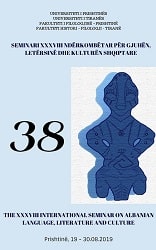Ëndrra si toponim gjeografik “Makondo” e G.G Marquez-it dhe “Rrafshi” i Ismail Kadare-së
The Dream as a Geographical Toponym "Makondo" by G.G Marquez and "Rrafshi" by Ismail Kadare
Author(s): Donjeta GashiSubject(s): Human Geography, Fiction, Comparative Study of Literature, Albanian Literature, Existentialism, Philosophy of Mind
Published by: Univeristeti i Prishtinës, Fakulteti i Filologjisë
Keywords: Dream as geographical toponym; literature identity; geographical identity; comparative literature; Marquez; Kadare; universal; Makondo; Rrafshi; Theme; Motif;
Summary/Abstract: Often in literature, particularly when confronting literatures with each other, we see similarities in elements, themes or motifs between the two worlds, which in the first sight it would seem extremely distant, different and impossible. Creating a physical and geographical identity, an orientation of the topic of the author development, a daydreamer orientation, remembering his home and country, is a product of art written by both authors. Rrafshi, a fiction story (an invented world – imaginary place, a dream) aiming to explain a different viewpoint to the existing reality, it helps Kadare to reveal the harshness of life, love and death but also universalize the homeland. The same thing, even though miles away, we see in Marquez with the same aim to create an identity between life, death, love, fate and sacrifice, hence creating an afterlife, imaginary and daydreaming. “Makondo” and “Rrafshi” became synonyms of a reality full of pain, love and death, as a sacrifice for life! This study shall be based on these elements of the author. A confrontation of societies in a parallel word, with issues regarding the identity and origin, which reflect the myth of existence of human in space and time, a product of social and habit paradoxes of characters full of intrigues. For the readers, authors’ writings are a reflection of likeliness (the unrealistic) to a historical and geographical reality of a paradox which reveals boldness towards fear; reveals love towards hate as well as life towards death. What exactly represent these two literature themes, fictional stories that orient the reader towards an environment, with special features, which in fact do not exist? What are the similarities and differences between them? Why did Makondo and Rrafshi universalize? This work aims to confront these two authors/writings as well as demographic and topographic orientations in literature, a comparative confrontation and clash of values as well.
Journal: Seminari Ndërkombëtar për Gjuhën, Letërsinë dhe Kulturën Shqiptare
- Issue Year: 2019
- Issue No: 38.2
- Page Range: 204-216
- Page Count: 13
- Language: Albanian

